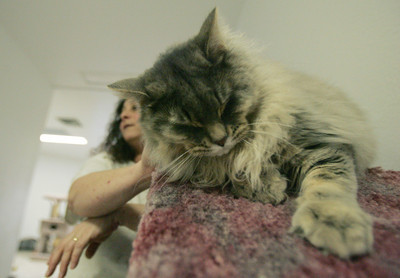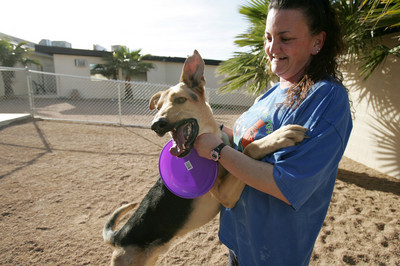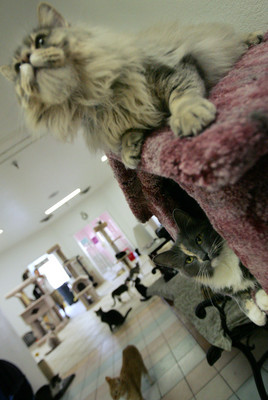INNOCENT VICTIMS
Under other circumstances, it might be a funny anecdote: A man walks through the door with 10 rabbits in his arms, hands them over to Doug Duke then walks out.
But it wasn't the Easter bunny delivering those rabbits to the Nevada Society for the Prevention of Cruelty to Animals in February; it was a man who lost his house to foreclosure, leaving his pets to an uncertain future at an animal shelter already overwhelmed with forsaken pets.
While local pet owners have long been giving up their animals when they move, the housing crunch has contributed to an alarming increase in what many have dubbed "foreclosure pets." And Las Vegas facilities are overwhelmed with them, animal rescue and shelter representatives say.
"It is the No. 1 way we're getting animals right now," says Duke, the executive director of the Nevada SPCA. "We've really noticed it in the last three months and it seems to be escalating on a weekly basis."
Duke says the SPCA has received a goose, ducks, numerous chickens, rabbits, guinea pigs, a potbellied pig and ferrets recently. Cats and dogs make up the majority of the foreclosure pets, though.
It's hard to keep track of the numbers because the shelter receives so many calls, Duke adds, but he estimates 150 animals a month are coming in because their owners give them up or leave them behind when they lose their homes. Las Vegas is among the leaders in the nation in foreclosures.
Prudential Americana real estate agent Linda Pelaez has a reputation as a problem solver. When other agents go into a foreclosed home and find an abandoned pet, they call her because she knows what to do. Lately, her usual solution -- to call the Las Vegas Humane Society for help -- isn't working.
"All of the shelters, all of the resources we'd normally go to are maxed out," says Pelaez, who has been in local real estate for six years. "Before, I was able to get assistance with these organizations."
In the past few months, three or four agents have contacted her because they had listed foreclosed homes where cats and dogs were found abandoned. It's becoming so frequent that agents are naming the animals after the streets they're found on, she says. One cat, McWilliams, is still living outside the empty house where it was found on McWilliams Avenue; neighbors are feeding it.
Recently, a homeowner called her to report a dog chained to a tree stump in the backyard. Because it was still considered private property, Pelaez couldn't go in to the house and help; she had to call animal control. The protocol is for the agency to leave a notice that the animal will be taken from the home in 24 hours, Pelaez says, which can be the difference between life and death for a pet that's starving or dying of thirst.
"One agent even found fish abandoned, left there to die," Pelaez says. "I don't know what chance fish have to survive on their own."
Once a house has been foreclosed, it can take at least a week for an agent to come to the property to inspect it. If animals have been left behind, they can die, she adds.
"We're getting overwhelmed by them, to tell the truth," Las Vegas Humane Society president Karen Layne says of foreclosure pets. Instead of a shelter, the Humane Society relies on volunteers to foster pets while they await adoption. Right now, they're full.
"Somebody called me, said: 'This guy's got a pit bull, unneutered. He's losing his house and wants to get rid of the dog,' " Layne says. "Another guy found a cat inside his garage; it was fixed and declawed. That's obviously someone's pet."
Layne and other volunteers are encountering what they say is an unusual number of rescued animals with microchips. When they contact the owner on the chip, they discover that person is no longer at the residence or the phone number has been disconnected. While they don't know for sure, Layne says she thinks those animals are foreclosure pets.
Duke says his staff also is hearing reports of real estate agents going into homes and finding dead pets.
Calls come in daily from people who expect to lose their homes this spring and summer, he adds. They want advice on what to do with their animals.
"A lot of these people are in tears, their souls are crushed, their hearts are broken," Duke says. "It reminds me of the Iraq war when people were coming in here because they didn't know if they would be coming home. We see this every day. "
The majority of people who call say they have to find new homes for their pets because they're either moving out of state or into an apartment that doesn't allow pets, Duke says.
"The calls we get from people who expect to lose their homes, they don't want to lose their animals. At least they're working on finding the animals a safe solution," Duke says.
Contact reporter Sonya Padgett at spadgett@reviewjournal.com or (702) 380-4564.
PETS AND APARTMENTS When people lose their homes to foreclosure and give up their pets, it’s usually for two reasons: They can’t afford the cost of the pet’s upkeep or they’re moving into an apartment that restricts pet owners, says Doug Duke, executive director of the Nevada SPCA. Most apartments in Las Vegas require a larger security deposit and sometimes an extra amount of rent from renters with pets, he says. That can be as much as a $400 deposit for one animal and an extra $25 a month in rent. Costs vary but it adds up and can present a problem for a person already in a financial crisis. Sometimes, apartment managers don’t allow certain breeds or larger pets. For those facing such circumstances, Duke recommends holding on to your pet as long as possible or ask for help from family and friends. If you may have to give up the pet later, make sure its vaccinations are updated and it’s spayed or neutered before it comes to that, he adds. For those moving into an apartment who want to keep their pet, Duke advises writing a pet resume and presenting it to the property management. It helps to humanize the animal and shows you as a responsible pet owner, he says. “It seems crazy but it’s not. Get a resume together for your dog (or cat). Mention they’re up to date on shots, that they’re microchipped. Talk about how long they’ve lived with you,” Duke says. “You’re personalizing an animal so the landlord is making a decision about Fluffy instead of a pit bull.” REVIEW-JOURNAL




















